
Events
Upcoming Events
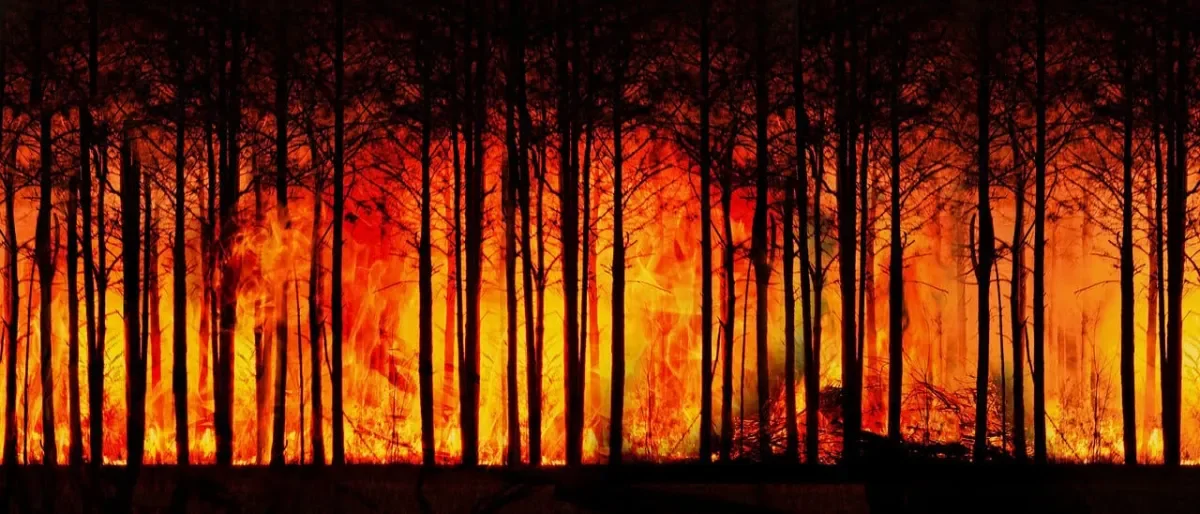
6 x online workshops for reporters, editors, producers, media professionals and others involved in communicating about climate change
The DCU Institute for Climate and Society with support from Coimisiún na Meán is offering a series of online sessions aimed at helping journalists strengthen and deepen their climate change coverage.
This online course will run weekly during lunchtimes from late September through October. Exact dates are TBC - we are asking stakeholders to register their interest in advance by emailing david.robbins@dcu.ie
Past Events
2025
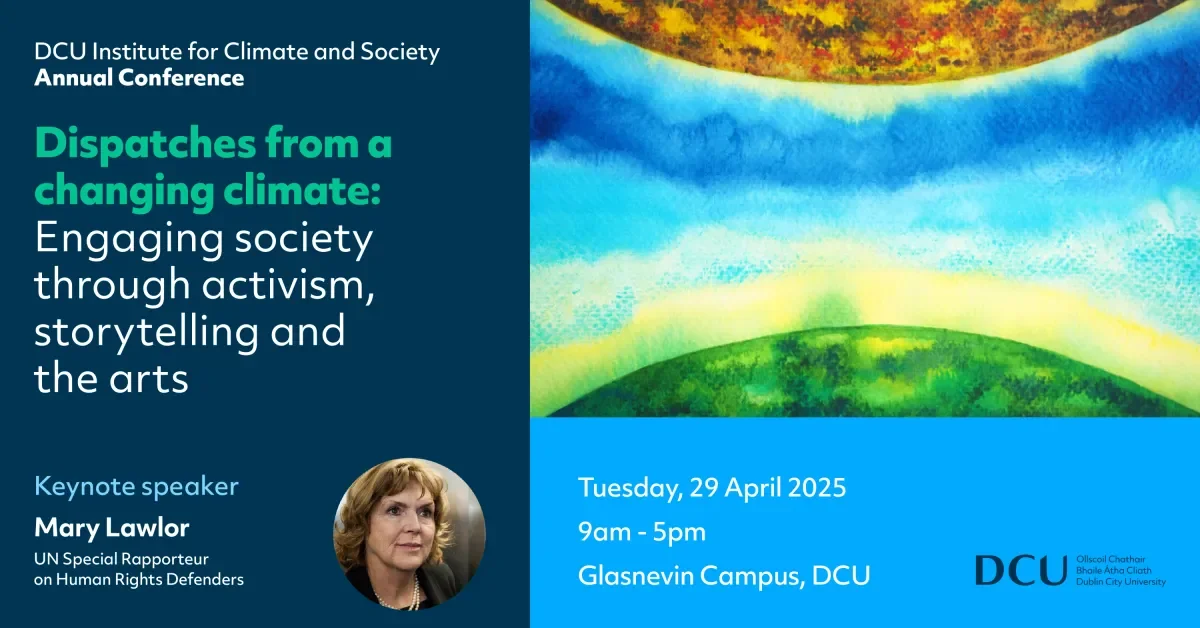
The Institute for Climate and Society annual conference will take place on Tuesday, 29 April in HG20, Nursing and Human Sciences Building, on the DCU Glasnevin Campus.
This year's theme is 'Dispatches from a changing climate: Engaging society through activism, storytelling and the arts'.
The keynote speaker will be Mary Lawlor, UN Special Rapporteur on Human Rights Defenders, who will deliver a report to the UN General Assembly this autumn on the challenges faced by human rights defenders working in the context of climate change and a just transition.
The conference will also feature a range of speakers from the arts, the media and academia.
2024
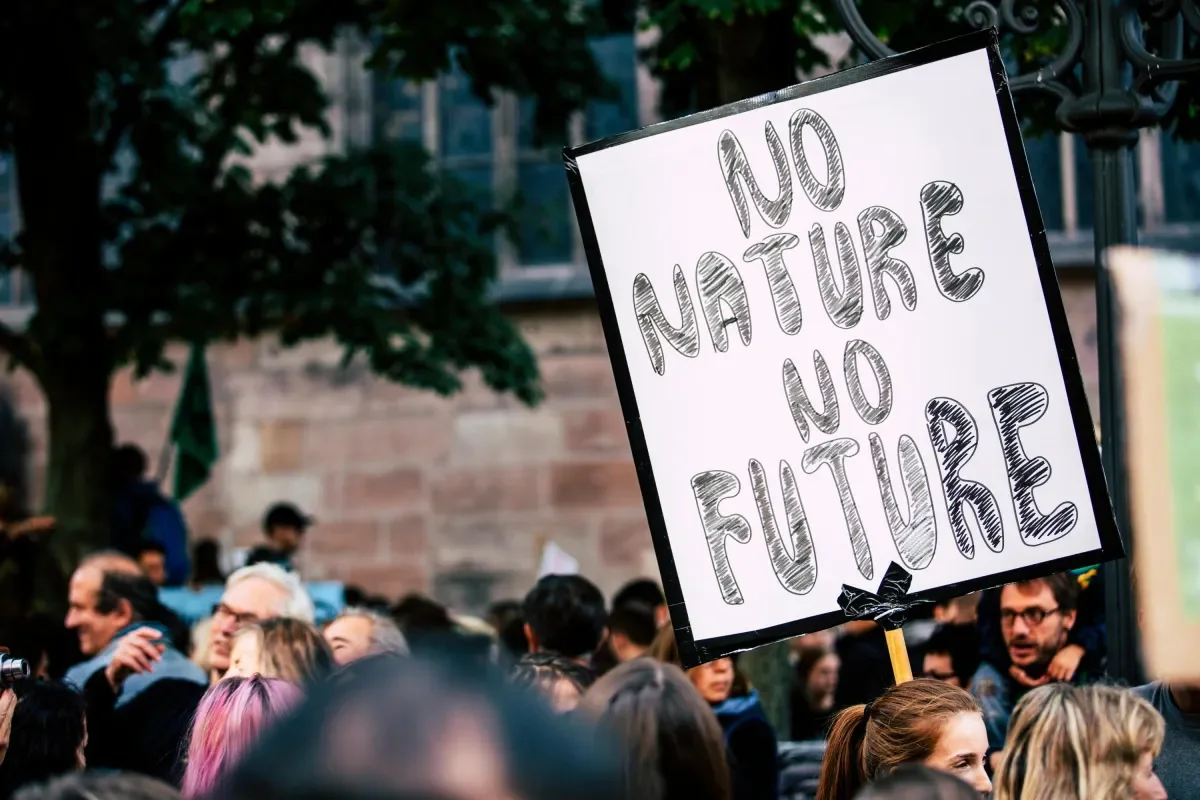
The DCU Centre for Climate and Society, Friends of the Earth Ireland and Stop Climate Chaos hosted a climate and environment hustings on 20th November at the Royal Irish Academy in Dublin. Representatives from seven parties discussed their plans for the next phase of Ireland’s climate action journey, in advance of the 29th November General Election. Read more and watch the recording here.
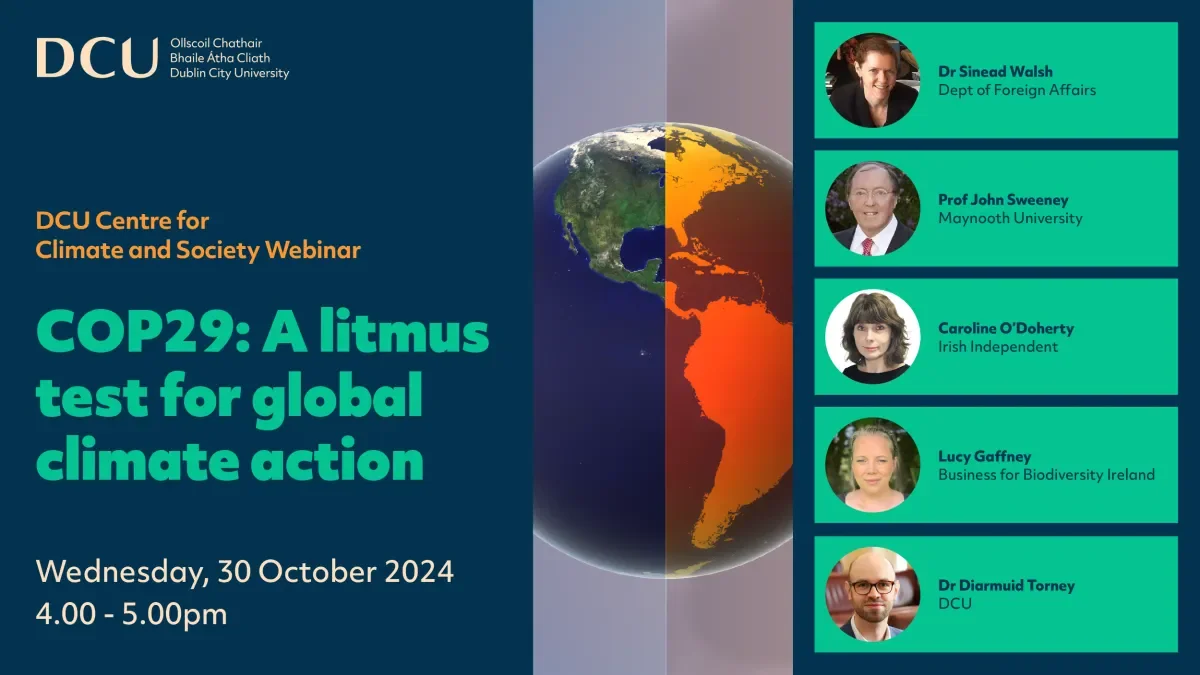
The DCU Centre for Climate and Society held a webinar on 30th October with a panel of experts to discuss the key issues on the COP29 agenda.
- Dr Sinead Walsh, Climate Director at Ireland’s Department of Foreign Affairs
- Prof John Sweeney, Emeritus Professor, Geography Department at Maynooth University
- Caroline O’Doherty, Environment Correspondent, Irish Independent
- Lucy Gaffney, Head of Business for Biodiversity Ireland
Moderated by Dr Diarmuid Torney, Associate Professor, DCU School of Law and Government and Centre for Climate and Society Co-Director.
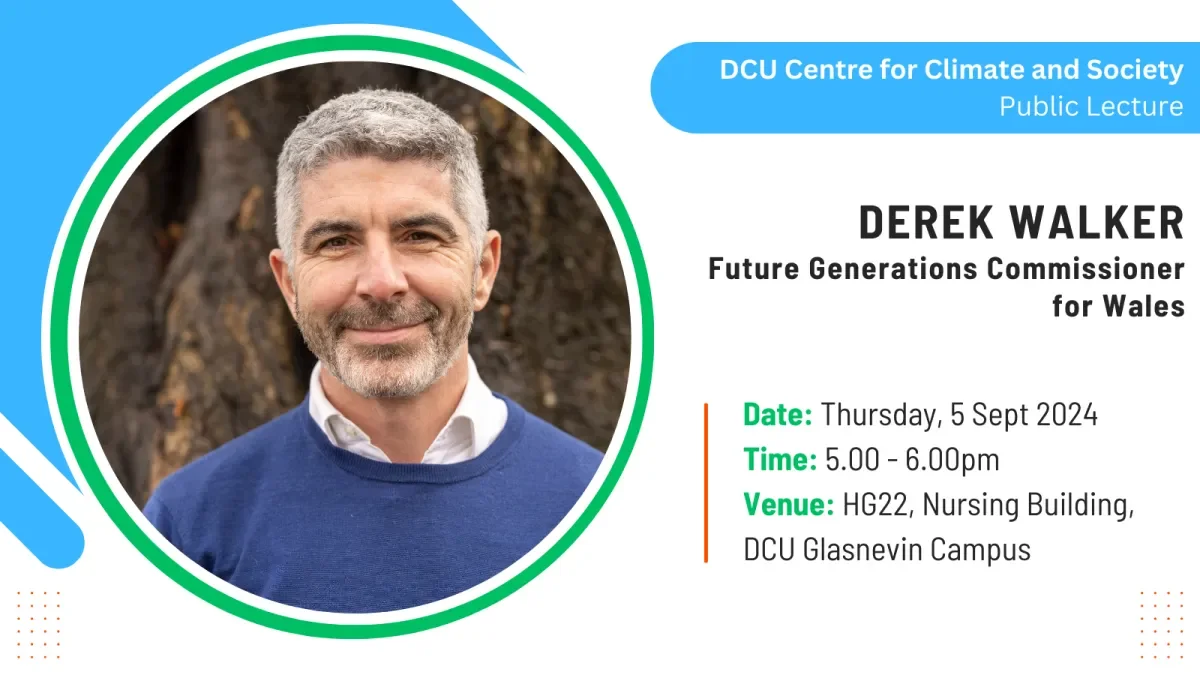
The Centre for Climate and Society hosted a public lecture on Thursday 5th September by Derek Walker, the Future Generations Commissioner for Wales. As Commissioner, Derek Walker's role is to protect and promote the needs of future generations.

The Centre for Climate and Society hosted an in-person panel discussion on the theme of 'Supporting climate action through activism and litigation' on Friday 17 May on the DCU Glasnevin campus.
The event was part of the Hybrid European Festival of Democracy, a discussion festival that took place in a range of physical locations across Europe that sought to connect people who share an interest in the future of society. The event involved simultaneous, linked discussion events on the same topic taking place in Dublin and Helsinki, with speakers joining also from LSE and the University of Trento. Speakers included Centre Director Dr Diarmuid Torney and Clodagh Daly from Community Law and Mediation.
The event took place as part of the RETOOL project: Strengthening democratic governance for climate transitions - a new three-year Horizon Europe project coordinated by Dublin City University and involving nine partners across eight European countries.
Further details of the event are available here.
A team from the DCU Centre for Climate and Society delivered a climate engagement and communication workshop to key stakeholders on May 14.
Representatives from government departments, local authorities, State agencies, NGOs, and businesses attended the workshop, which was part of a project commissioned by the Department of Environment, Climate, and Communications (DECC).
The purpose of the event was to develop a climate change engagement and communications training course to be rolled out extensively across the private and public sectors as part of DECC's "Year of Engagement" programme.

The Centre for Climate and Society annual conference took place on Tuesday, 16 April on the DCU Glasnevin Campus. The conference featured keynote contributions from Mary Robinson, Former President of Ireland and Chair of The Elders, participants in Ireland’s Children and Young People’s Assembly on Biodiversity Loss, and Ella Saltmarshe, co-founder of The Long Time Project.
2023
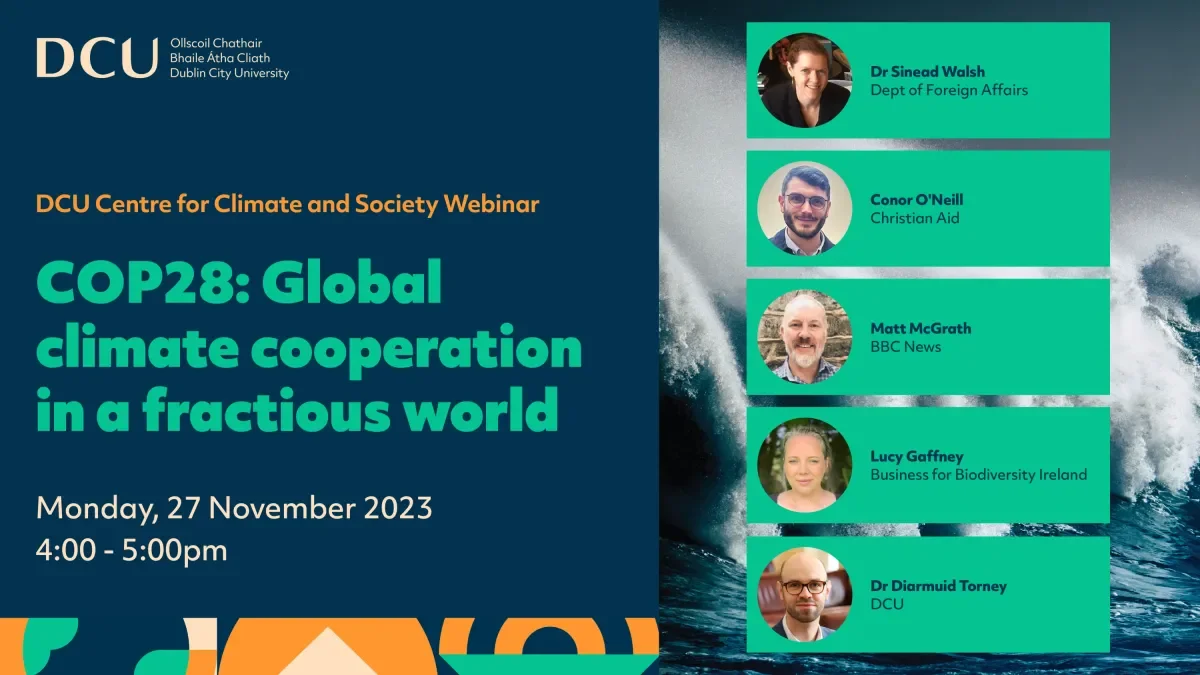
The DCU Centre for Climate and Society held a webinar on November 27th with a panel of experts to discuss the key issues on the COP28 agenda and what's at stake.
- Dr Sinead Walsh, Climate Director at Ireland’s Department of Foreign Affairs
- Conor O'Neill, Head of Advocacy and Policy, Christian Aid Ireland
- Matt McGrath, Environment Correspondent, BBC News
- Lucy Gaffney, Head of Business for Biodiversity Ireland
Moderated by Dr Diarmuid Torney, Associate Professor, DCU School of Law and Government and Centre for Climate and Society Co-Director.
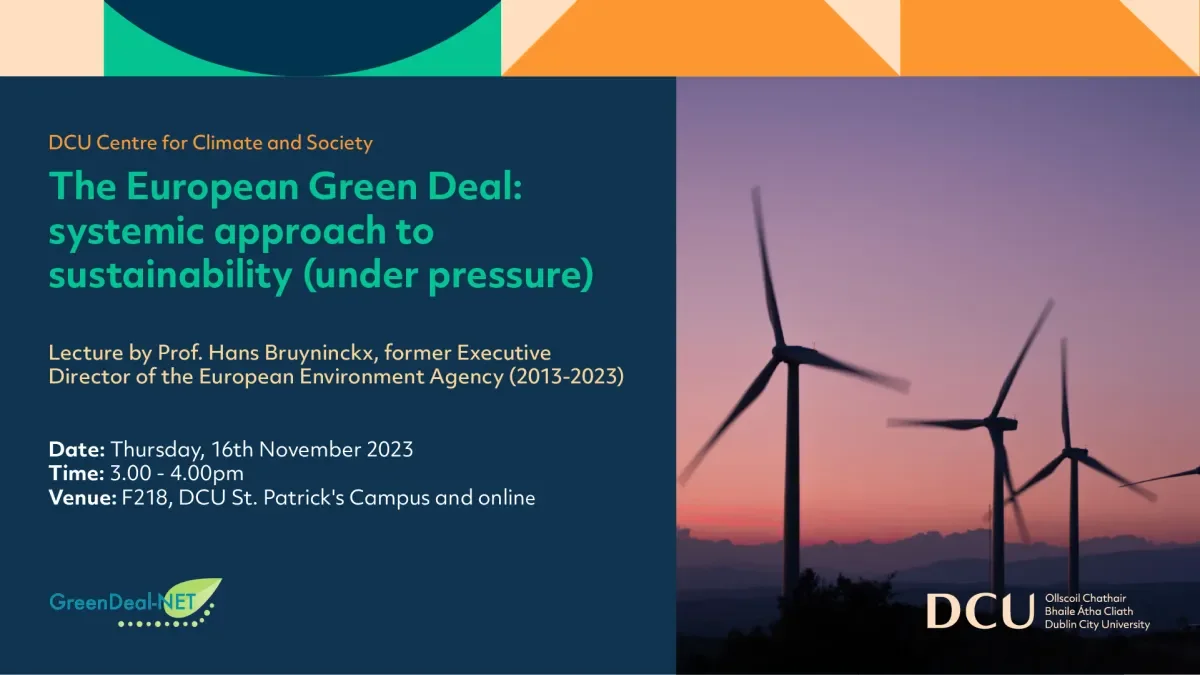
The Centre for Climate and Society hosted a public lecture by Professor Hans Bruyninckx on "The European Green Deal: systemic approach to sustainability (under pressure)" on November 16th.
The European Green Deal has been a game changer in the EU’s approach to environmental and climate policies. Its focus on systemic transitions is deeply embedded in the policy targets, the long-term objectives, the interconnected nature of the policy objectives, and the link with the social and economic dimensions of the green transition. However, given today’s macro-economic challenges and the uncertain geopolitical context the European Green Deal has come under pressure. In his lecture, Hans Bruyninckx explained why staying the course is crucial for Europe even though political and economic arguments are used to lower ambitions or ‘push the pause button’. Watch the lecture here.
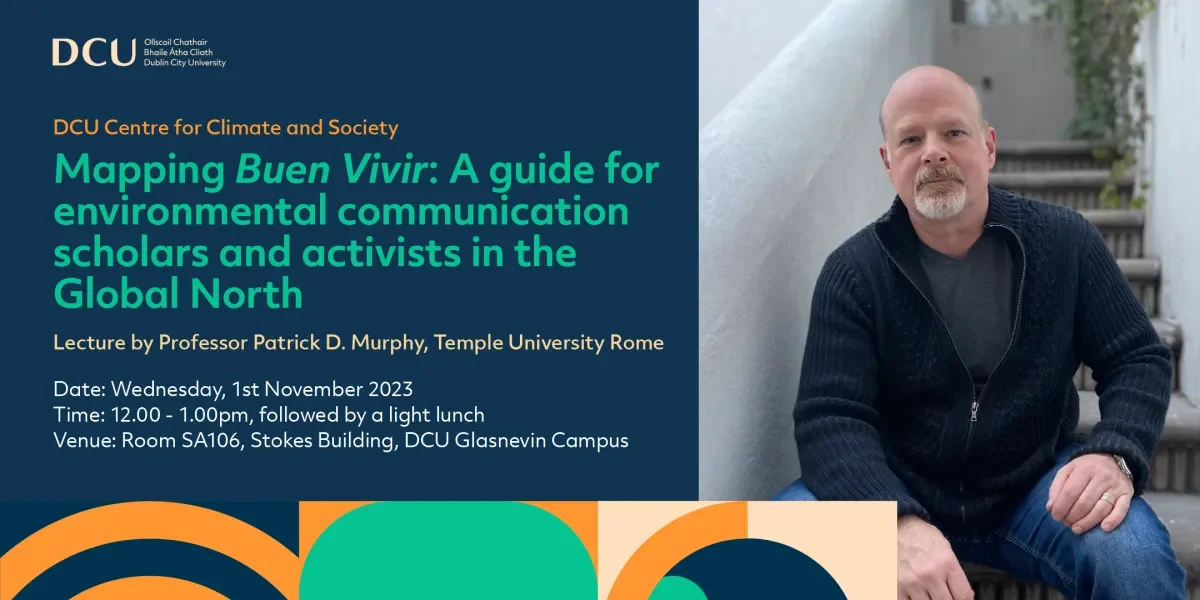
The Centre for Climate and Society hosted a public lecture by Professor Patrick D. Murphy on "Mapping Buen Vivir: A guide for environmental communication scholars and activists in the Global North" on November 1st.
The notion of “buen vivir” has become one of the most discussed and debated concepts within the contemporary emergence of environmental transition discourses. Surfacing in academic and activist circles in Latin America more than twenty years ago, the concept of “buen vivir” has been instrumental in policy-making, most famously with its incorporation into Ecuador’s constitution and Bolivian public policy. Part of the appeal of buen vivir comes from its association with “good living” or “living well,” a translation that imbues it with an elasticity that, nevertheless, can lead to misinterpretations, and political and cultural appropriation. This talk drew from the deep pool of scholarship to map and explicate buen vivir. Read more.
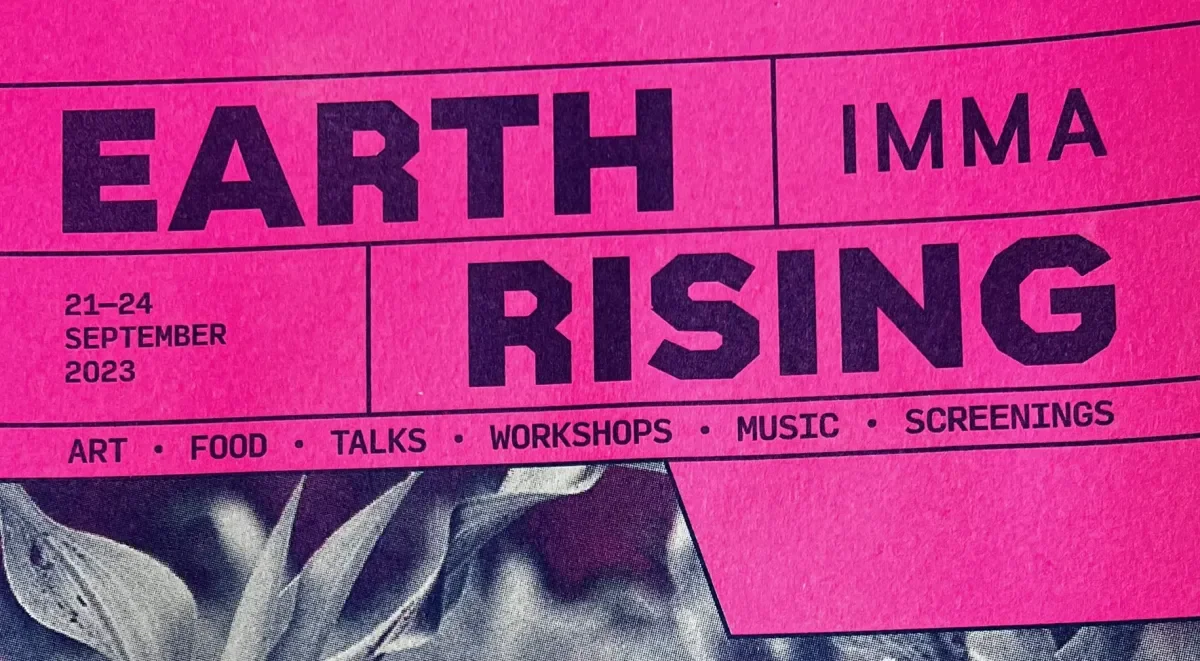
The DCU Centre for Climate and Society co-curated the 2023 Earth Rising talks stage, bringing together influential voices from diverse fields to explore creative solutions for environmental and societal change. Earth Rising is an annual four-day festival aimed at addressing the climate crisis and inspiring collective action towards a sustainable and hopeful future. The festival took place from 21 to 24 September 2023, at the Irish Museum of Modern Art (IMMA) in Kilmainham.
Centre Director Dr Dave Robbins chaired a discussion on 'Climate journalism: How to cover a world on fire,' and Centre Co-Director Prof Pat Brereton presented on 'Greening Cinema' and how film can provoke engagement around the climate crisis. Centre members Dr Rowan Oberman (Institute of Education), Dr Jimmy O’Keeffe (School of History and Geography) and Dr Fabiola Schneider (Business School) spoke about their research on climate education, geography and sustainable finance. The panel discussion was chaired by Centre Co-Director Dr Diarmuid Torney.
The Centre for Climate and Society and the DCU School of Law and Government hosted a public lecture by Tasneem Essop, Executive Director of Climate Action Network International, on September 8th. Tasneem is an expert on climate, energy, poverty and social justice issues and, as well as being Executive Director of Climate Action Network International, is the Founding Director of the Energy Democracy Initiative in South Africa. She has held various senior positions including in government (Provincial Minister for the Environment, Planning and Economic Development and Provincial Minister of Transport, Public Works and Property Management in the Western Cape), civil society (global climate policy and strategy leader for WWF International), and the trade union movement (COSATU Western Cape). She is also a qualified teacher. Watch the lecture here.
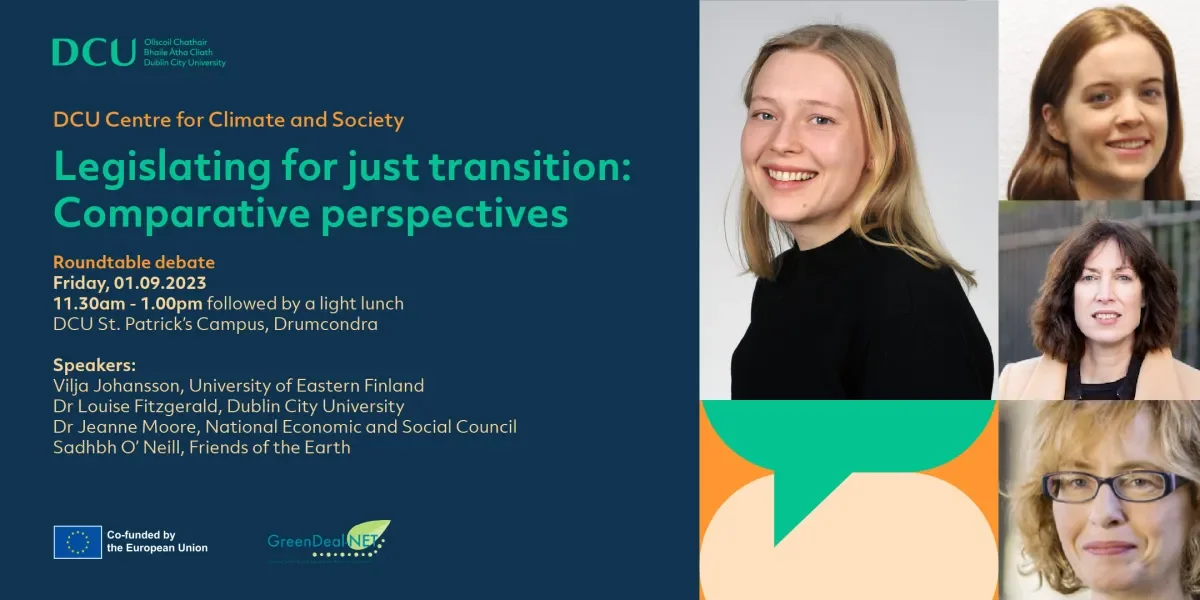
The DCU Centre for Climate and Society hosted a seminar on just transition featuring Vilja Johansson from the Center for Climate Change, Energy and Environmental Law at the University of Eastern Finland on 1st September 2023. Vilja spoke about the legal application of just transition in four climate change laws, comparing the Irish approach to the practices in Scotland, Spain and South Africa. There were also contributions from Dr Louise Fitzgerald, DCU; Dr Jeanne Moore, National Economic and Social Council; and Sadhbh O’ Neill, Friends of the Earth. Read more and watch the seminar here.
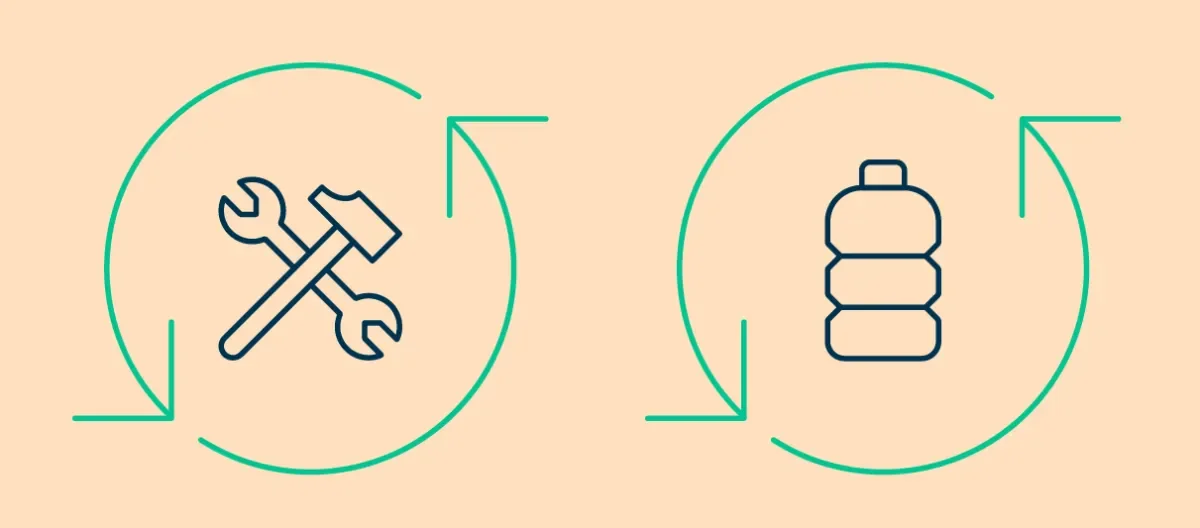
In partnership with the Adapt Centre and Rediscovery Centre, the DCU Centre for Climate and Society held a Think-In to explore how circular living can support a more sustainable future for communities in Ballymun. The event included an introduction to the topic and hands-on demonstrations, activities and discussions to show and discuss examples of sustainable and circular living through waste prevention, reuse and repair. The Think-In took place on Tuesday 13 June 2023 from 11:00 - 13.00 at the Rediscovery Centre in Ballymun.
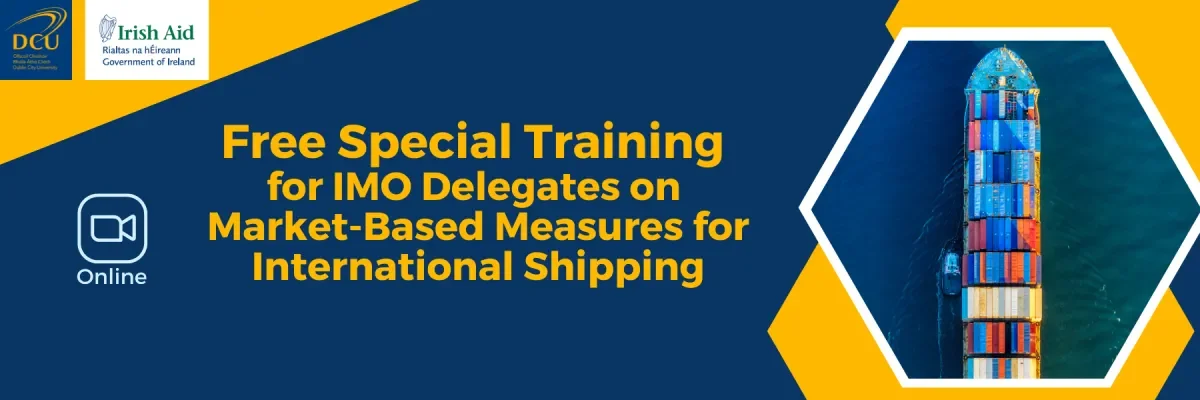
The International Maritime Organization (IMO) is working on a suite of measures to reduce greenhouse gas emissions from the international shipping sector. Market-based measures (MBMs) form part of this suite and can contribute to reducing emissions from the industry cost-effectively. In spring 2023 DCU offered an online training programme on MBMs for IMO delegates from Small Island Developing States, Least Developed Countries, and African States. The training was delivered by Dr Goran Dominioni with expert support from partners, including the World Bank and UNCTAD.
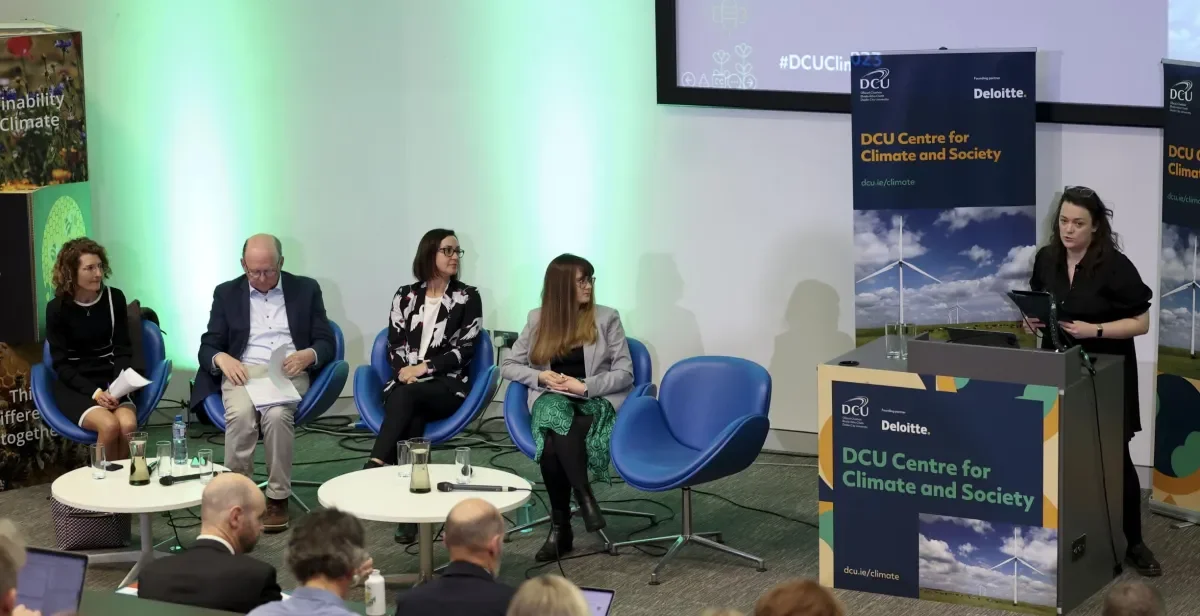
The Centre for Climate and Society annual conference, Rewild & Renew: How can Ireland turn the tide on climate change and biodiversity loss?, took place on 26 April 2023 on the DCU St. Patrick's Campus. Keynote speakers were Eamon Ryan T.D., Minister for Environment, Climate and Communications, and Minister for Transport, and Eoghan Daltun, rewilder, farmer, and author of An Irish Atlantic Rainforest: A Personal Journey into the Magic of Rewilding.
The DCU Centre for Climate and Society held a Climate Justice Week on 20-24 March 2023. Activities throughout the week explored issues of climate justice and community initiatives that work to provide more equitable and inclusive responses to the climate crisis.
2022
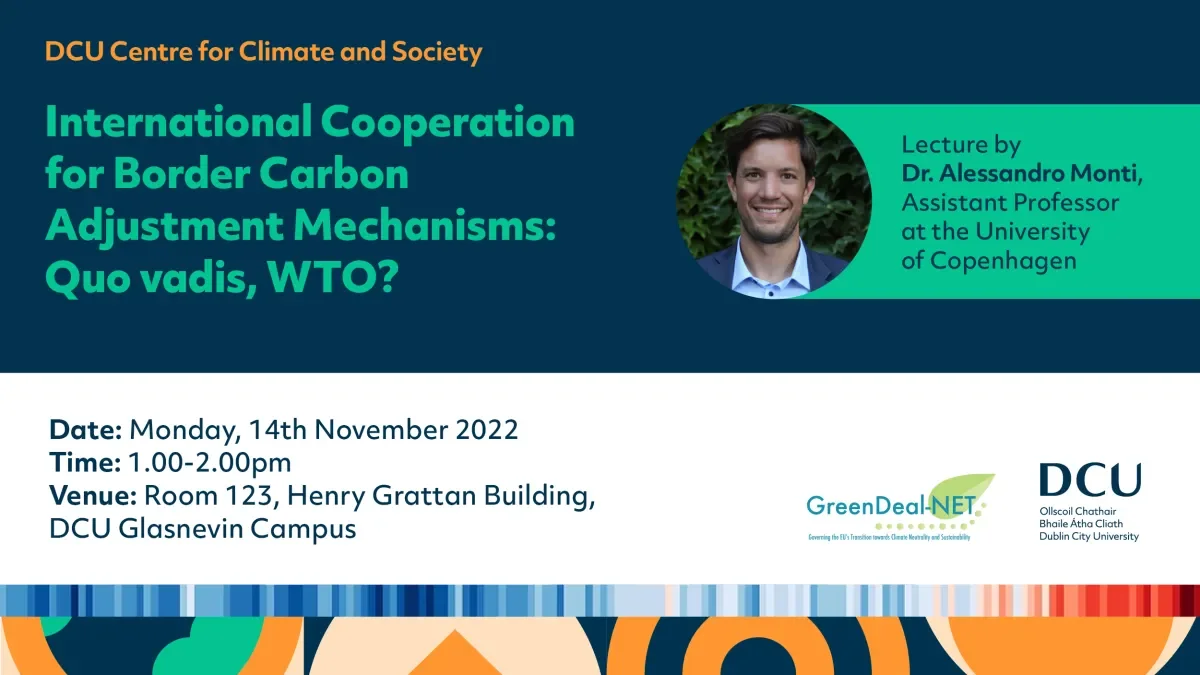
The DCU Centre for Climate and Society hosted a public lecture by Dr. Alessandro Monti from the University of Copenhagen on International Cooperation for Border Carbon Adjustment Mechanisms: Quo vadis, WTO? on 14 November 2022.
Implementing border carbon adjustment mechanisms is widely regarded as a crucial tool to tackle carbon leakage. At present, a number of major emitters, including the EU, has advanced proposals to introduce a charge at the border based on the levels of GHG emissions embedded in imported products. This lecture discussed the World Trade Organization's role in fostering multilateral cooperation on border carbon adjustment, while examining challenges and opportunities that may arise at the multilateral level.
Asia is one of the world’s most vulnerable regions to climate change. In 2021, climate disasters affected over 57 million people across the region. As a region with varying levels of socioeconomic development, and political and media freedom, the ability of governments to respond and prepare for climate emergencies is severely tested.
The Ireland India Institute and DCU’s Centre for Climate and Society held a seminar on Climate Change, the Media, and Politics in South and Southeast Asia on 8 November.
Three postgraduate students discussed these issues in three South and Southeast Asian countries.
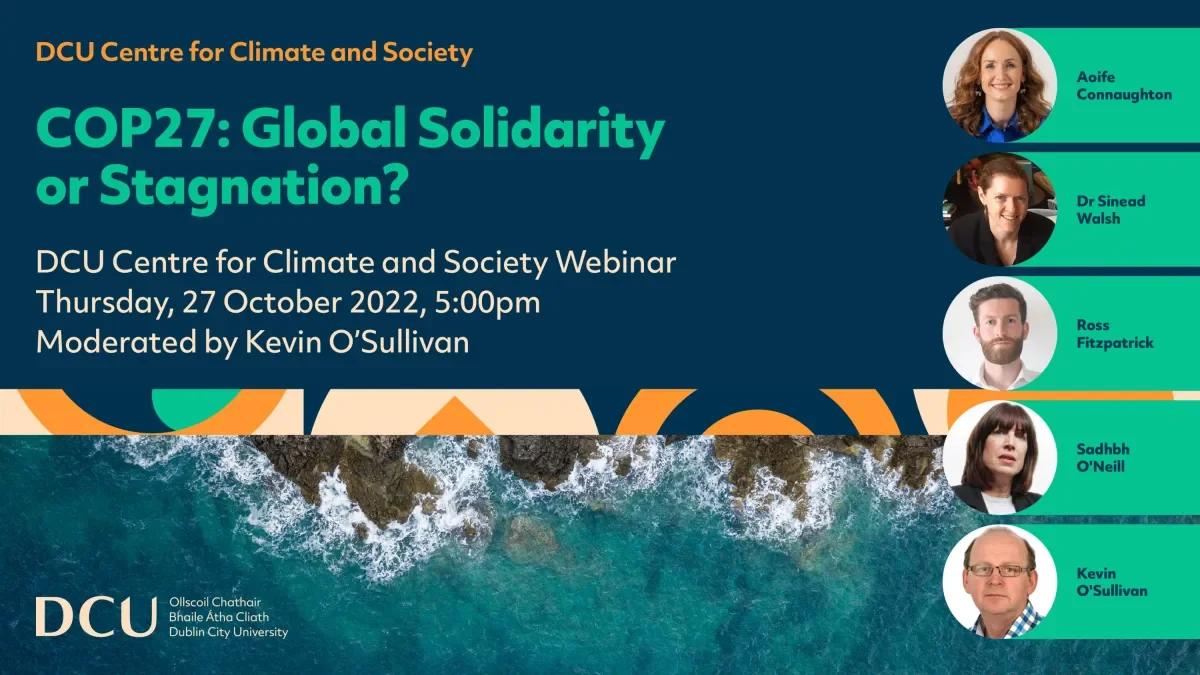
Will COP27 in Sharm El-Sheikh, Egypt be a moment for global solidarity or stagnation? The Centre held a webinar on Thursday 27 October at 5.00pm to preview what will be on the conference agenda. Speakers took a deep dive into what might transpire there across the political, media, corporate and governance arenas. The panelists were:
- Dr Sinead Walsh, Climate Director at Ireland’s Department of Foreign Affairs
- Sadhbh O'Neill, academic
- Ross Fitzpatrick, Policy & Advocacy Officer at Christian Aid Ireland
- Aoife Connaughton, a Director of Deloitte’s Climate and Sustainability practice
Moderated by Kevin O'Sullivan, Environment & Science Editor, The Irish Times.
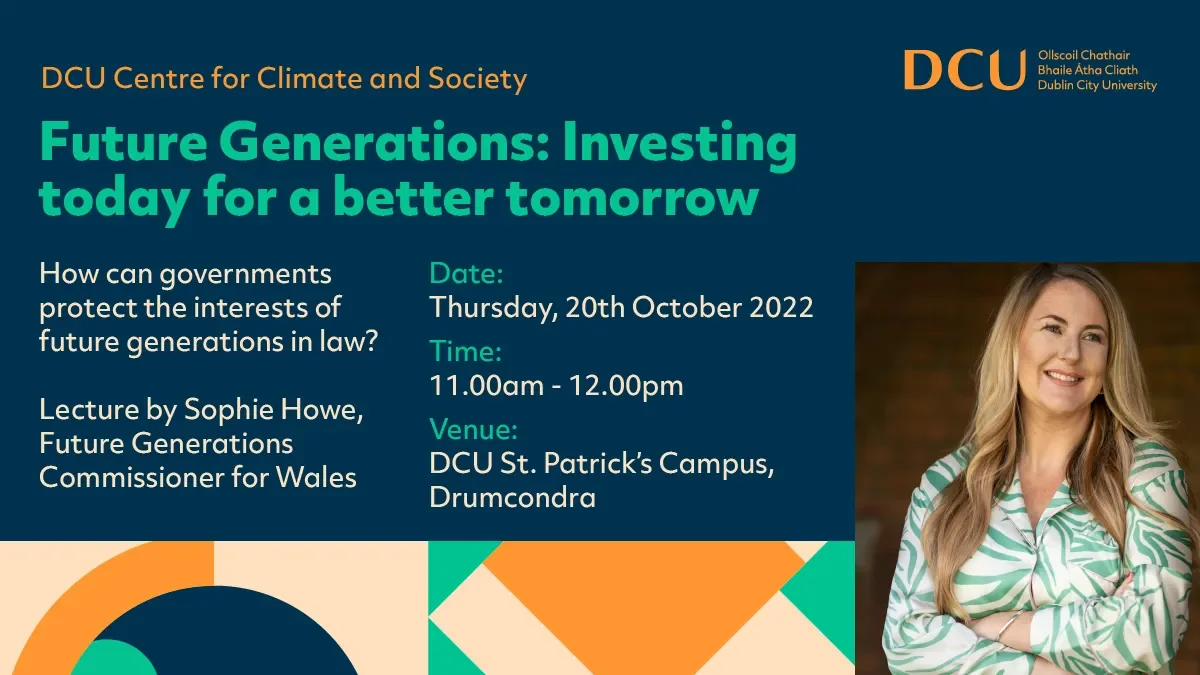
On Thursday 20 October the DCU Centre for Climate and Society hosted a public lecture by Sophie Howe, the Future Generations Commissioner for Wales on the St. Patrick's Campus. As Commissioner, Sophie Howe has a remit set out in law to be “the guardian of the interests of future generations in Wales”. She provides advice to the Government and other public bodies in Wales on delivering social, economic, environmental and cultural well-being for current and future generations, and assesses and reports on how they are delivering.
The Centre for Climate and Society delivered a 5-module Climate Literacy Training Course to broadcasters, from national outlets to community radio stations, through the Broadcasting Authority of Ireland’s Sustainability Network.

The International Maritime Organization (IMO) is working on a suite of measures to reduce greenhouse gas emissions from the international shipping sector. Market-based measures (MBMs) form part of this suite and can contribute to reducing emissions from the industry cost-effectively. In autumn 2022 DCU offered an online training programme on MBMs for IMO delegates from Small Island Developing States, Least Developed Countries, and African States. The training was delivered by Dr Goran Dominioni with expert support from partners, including the World Bank and UNCTAD.
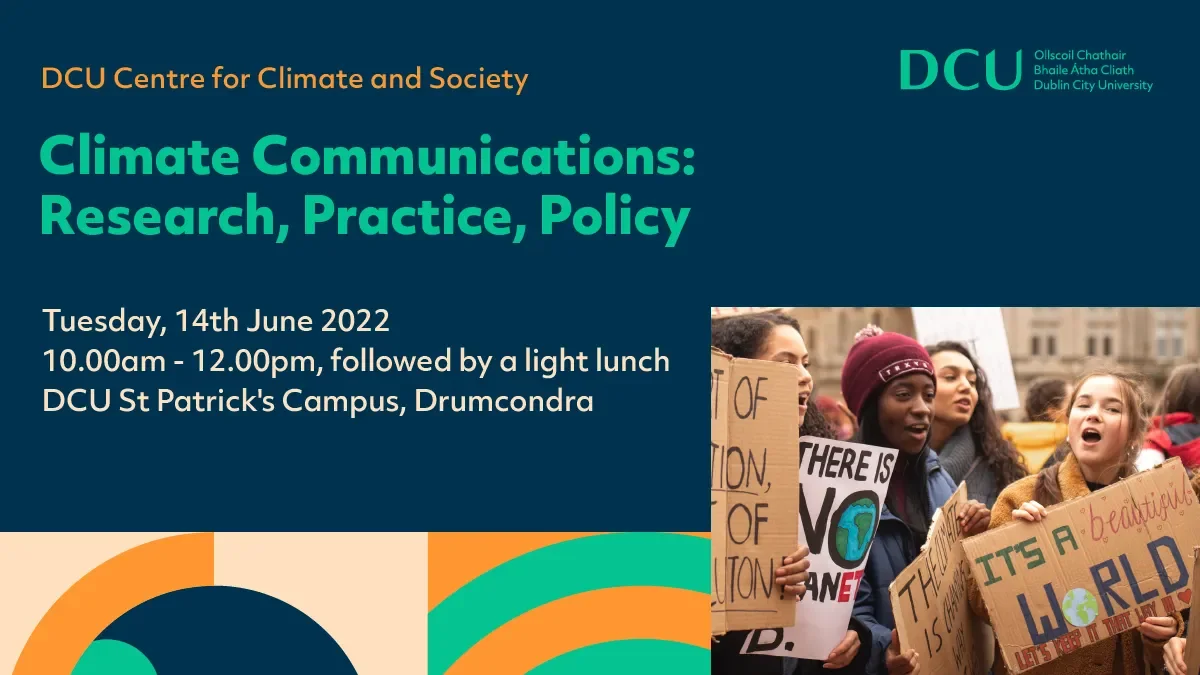
Climate Communications: Research, Practice, Policy
On 14 June, 2022 the DCU Centre for Climate and Society held a workshop on climate communications with keynote speaker Prof David Holmes, Founder and Director of the Monash Climate Change Communication Research Hub, Australia.
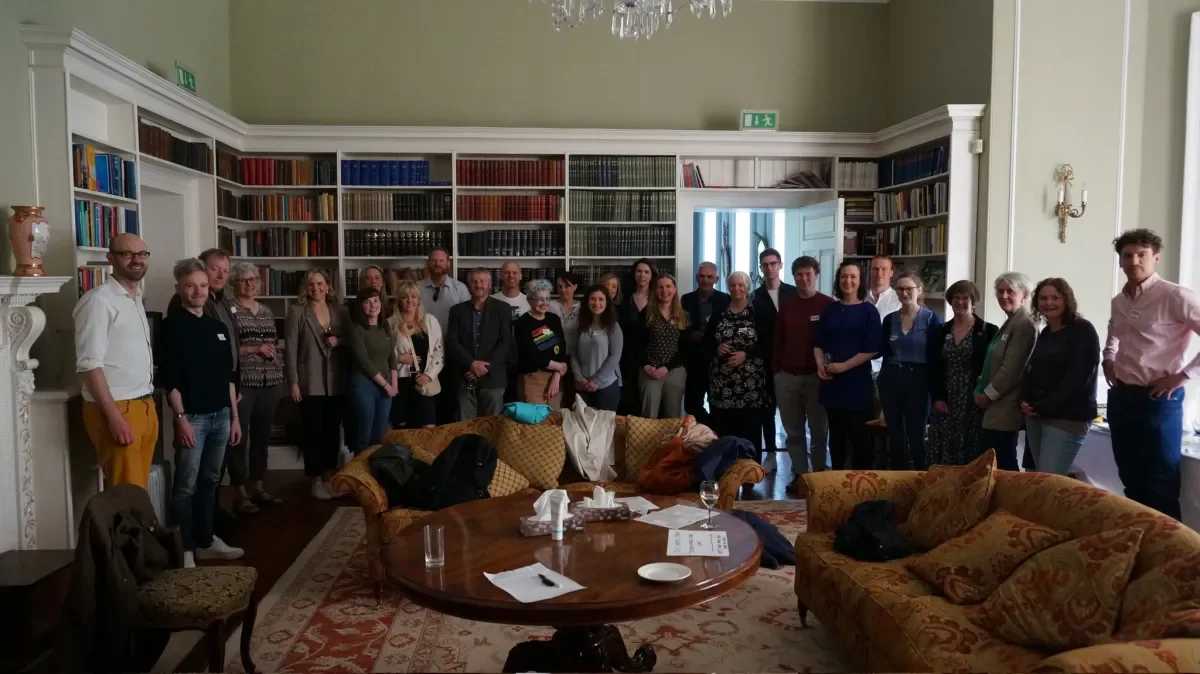
On June 10, 2022 the DCU Masters of Climate Change: Policy, Media & Society Alumni & Student Network was launched during an event on St. Patrick's Campus. The gathering offered a chance for current students and alumni to connect, agree on the goals of the Network and discuss plans for collaboration.
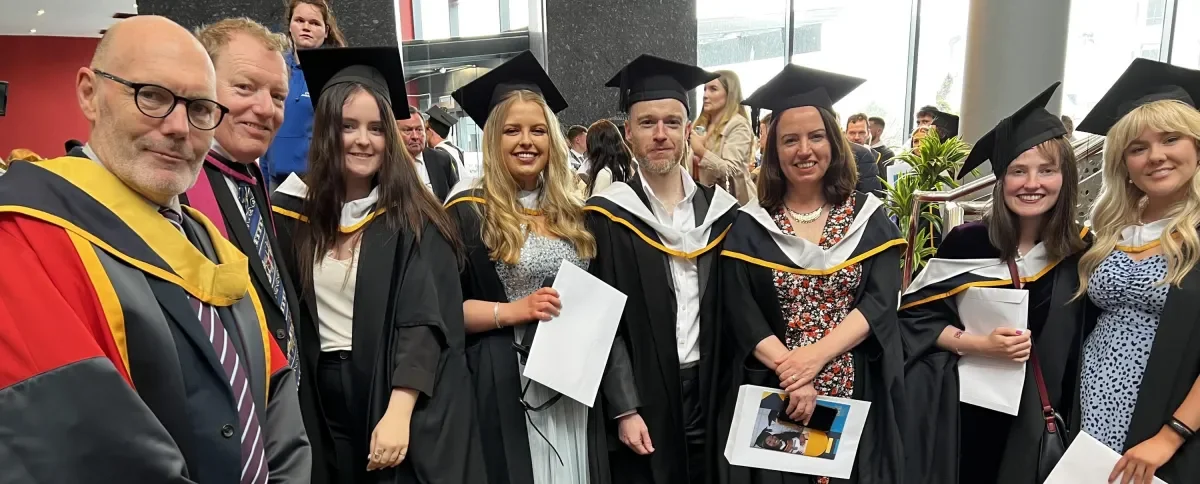
A catch-up graduation was held for DCU students who missed out on an in-person ceremony because of the pandemic. We were delighted to welcome back some of the first ever MSc in Climate Change graduates for a delayed in-person celebration of their achievements.
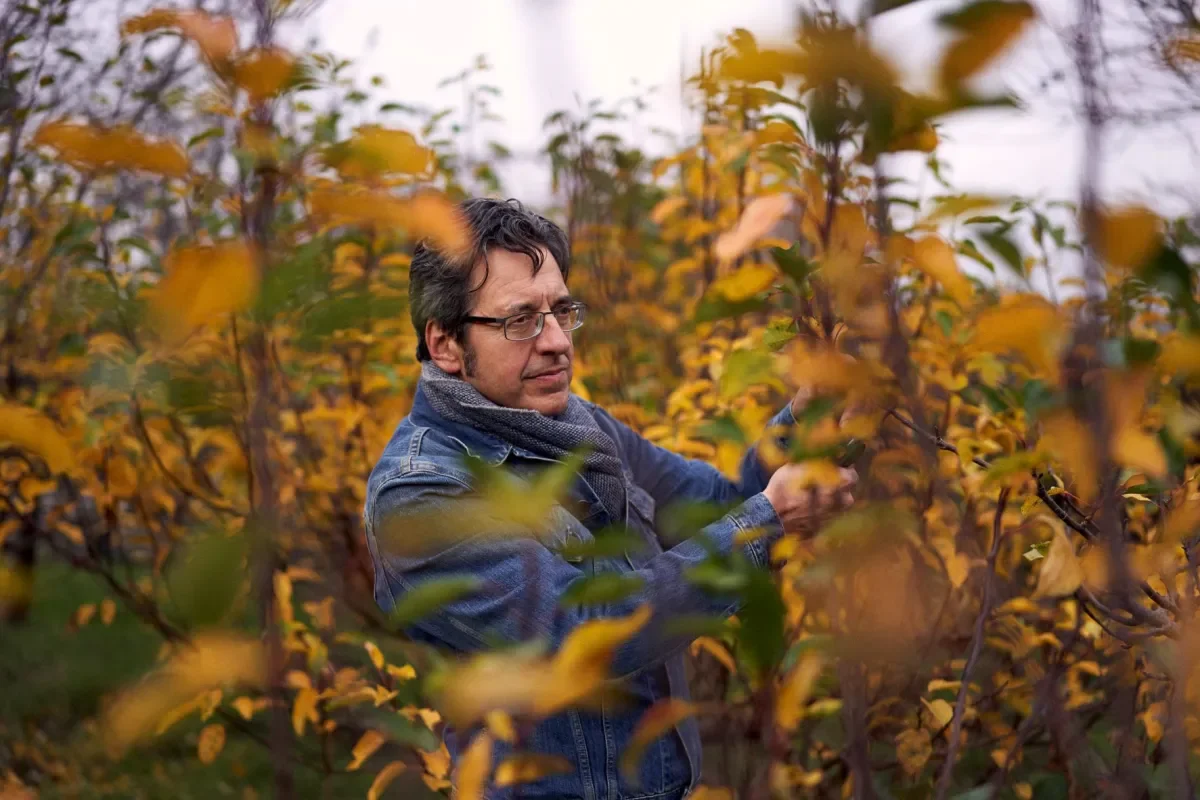
Centre Director Dr Dave Robbins talks turf, data centres and eco-anxiety with environmental activist, journalist and author George Monbiot, whose new book, Regenesis, was published on May 28.
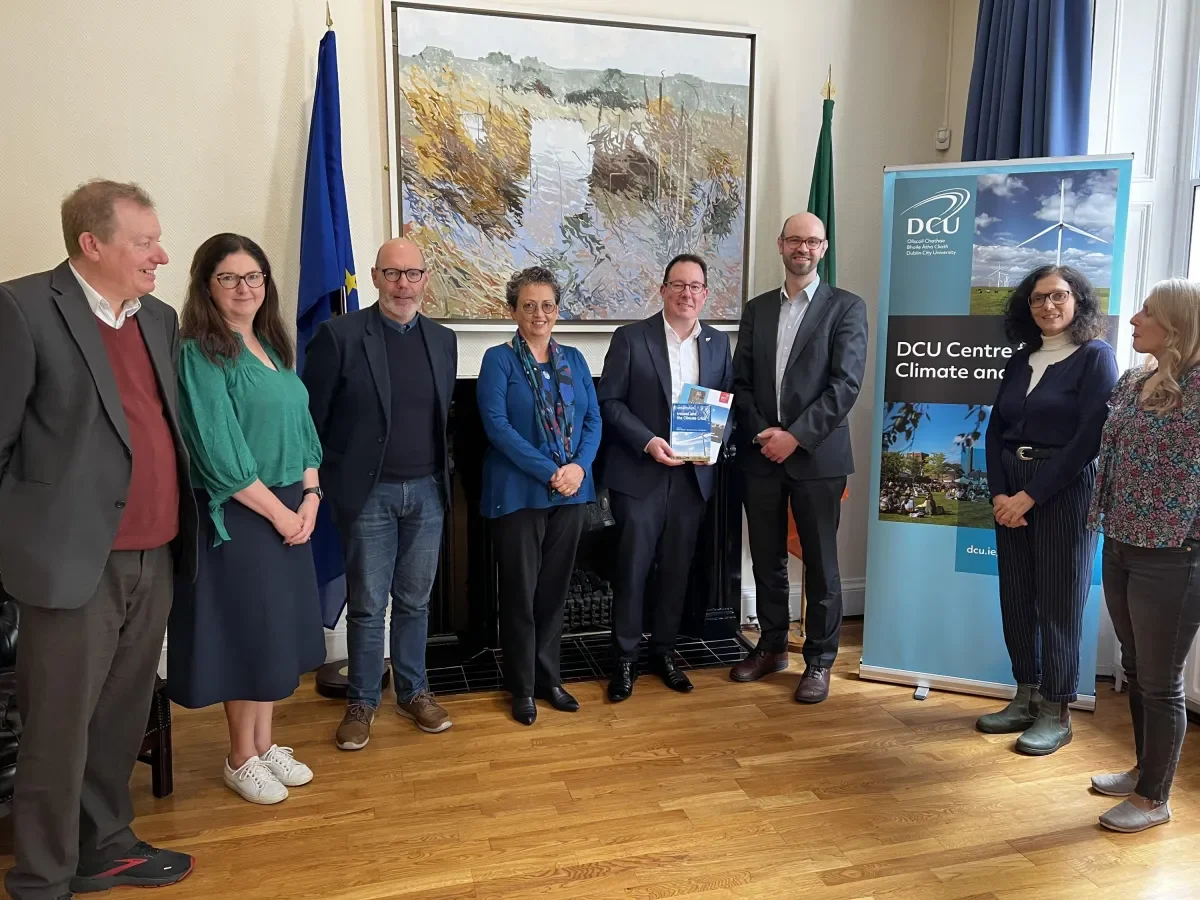
(Left to right) Prof Pat Brereton, Samantha Fahy, Dr David Robbins, Kay Harrison, Brad Burgess, Dr Diarmuid Torney, Dr Brenda McNally, Dr Aideen O'Dochartaigh.
It was an honour to welcome New Zealand Ambassador for Climate Change, Kay Harrison, and New Zealand Ambassador to Ireland Brad Burgess to DCU to meet with Centre members. We spoke about climate policy, agriculture, media and climate disclosures in Ireland and New Zealand.
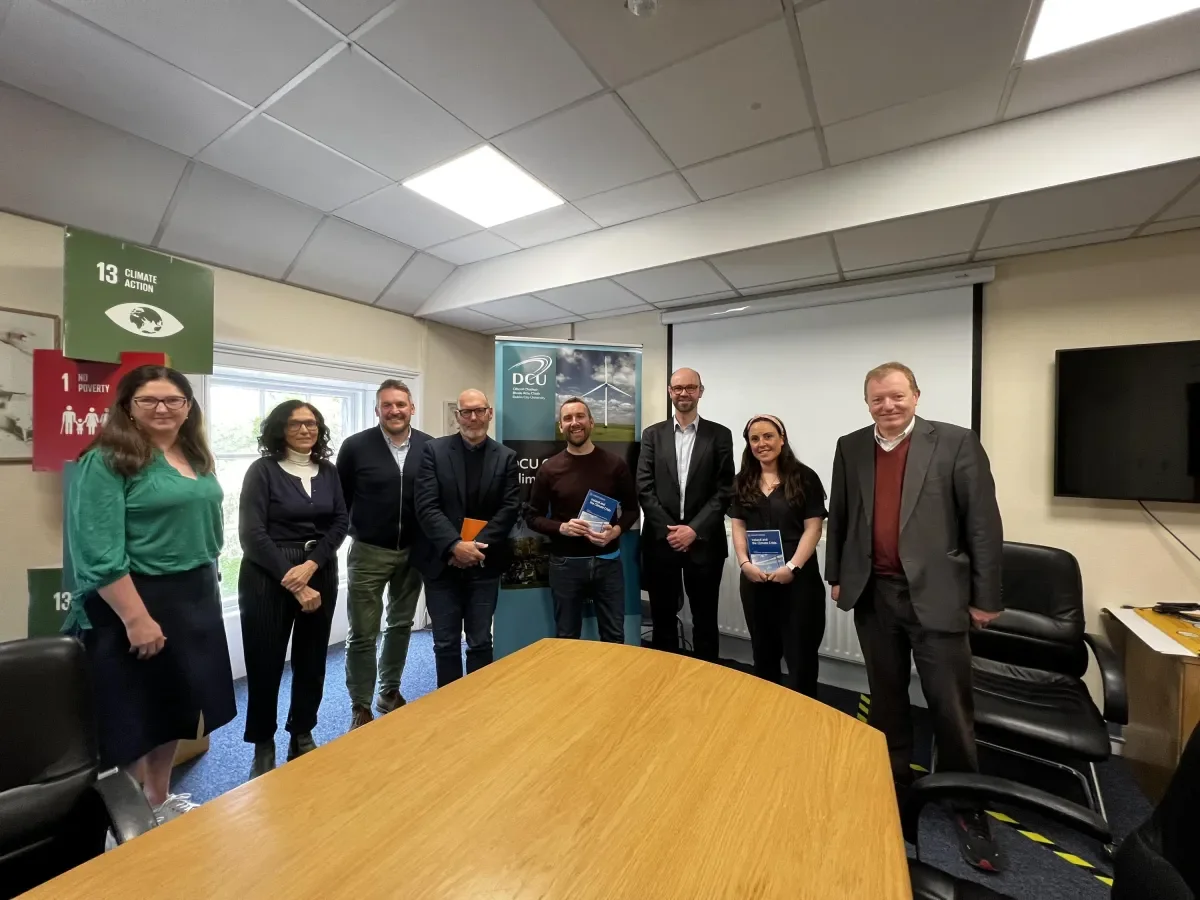
(Left to right) Samantha Fahy, Dr Brenda McNally, Dr Ben Mallon, Dr David Robbins, Jonathan Tench, Dr Diarmuid Torney, Rhiannon Evans, Prof Pat Brereton.
We were delighted to meet with Jonathan Tench, International Partnerships & Networks Change Maker in the Office of the Future Generations Commissioner for Wales and Rhiannon Evans, External Relations Manager at the Welsh Government Ireland Office. We discussed the Welsh Well-being of Future Generations Act and exchanged ideas on climate action.
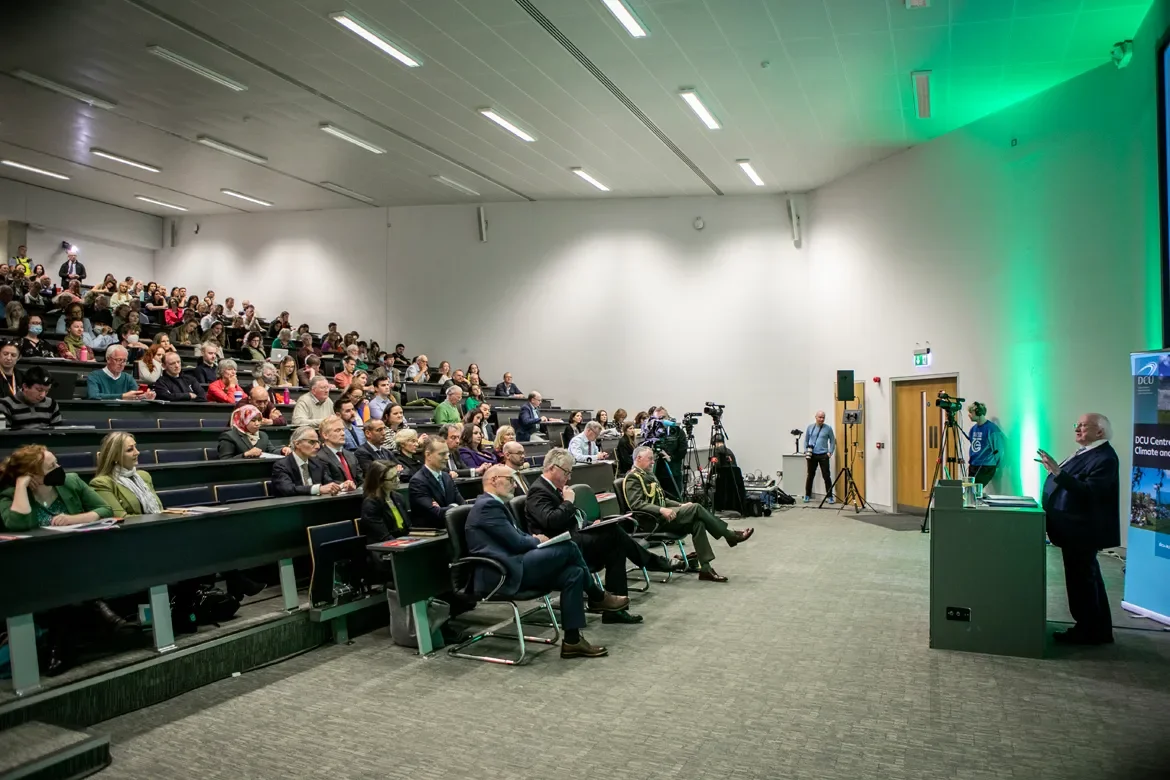
Inaugural Conference
The Advisory Board of the Centre for Climate and Society met for the first time on 29 April 2022.
Find out more about the Advisory Board members here.
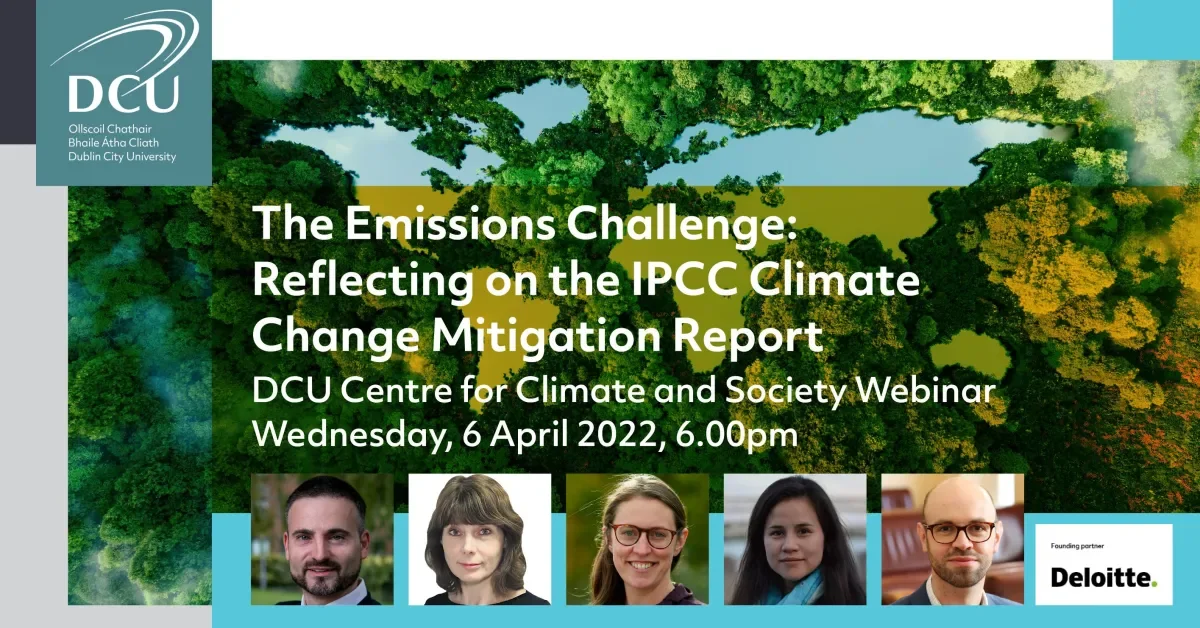
The Emissions Challenge: Reflecting on the IPCC Climate Change Mitigation Report
In early April the UN Intergovernmental Panel on Climate Change (IPCC) released a new report, outlining the need for 'rapid and deep' emissions reductions. The Centre held a webinar with an expert panel to discuss how Ireland can achieve this and the benefits of climate action.
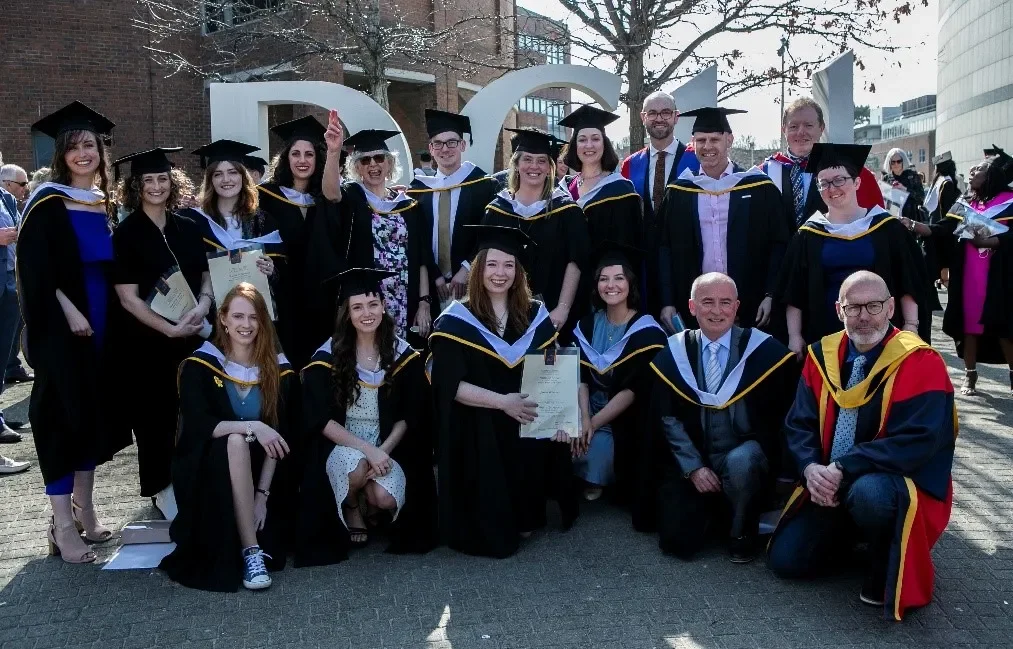
One of the highlights of any academic year is to celebrate our students’ graduation. The first in-person graduation of our students who finished the MSc in Climate Change took place on March 26. We celebrated students who completed the programme in September 2021.
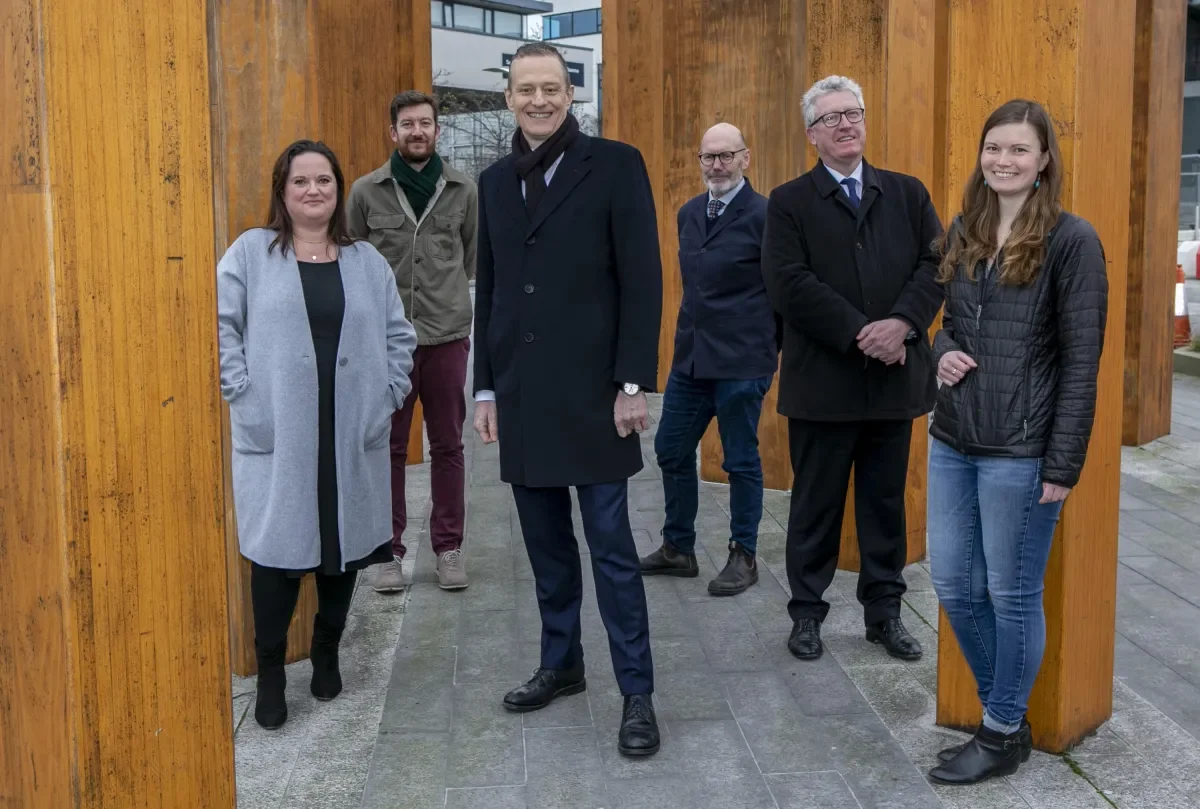
DCU’s Centre for Climate and Society has announced Deloitte as a founding partner. The Centre is Ireland’s first academic research centre devoted to leading societal responses to the climate crisis and has been established with the support of Deloitte. As part of a three-year commitment, the leading professional services firm will commit €176,000 annually to enable the Centre to examine how different social arenas such as politics, media, education and policy can influence climate action. Read more.
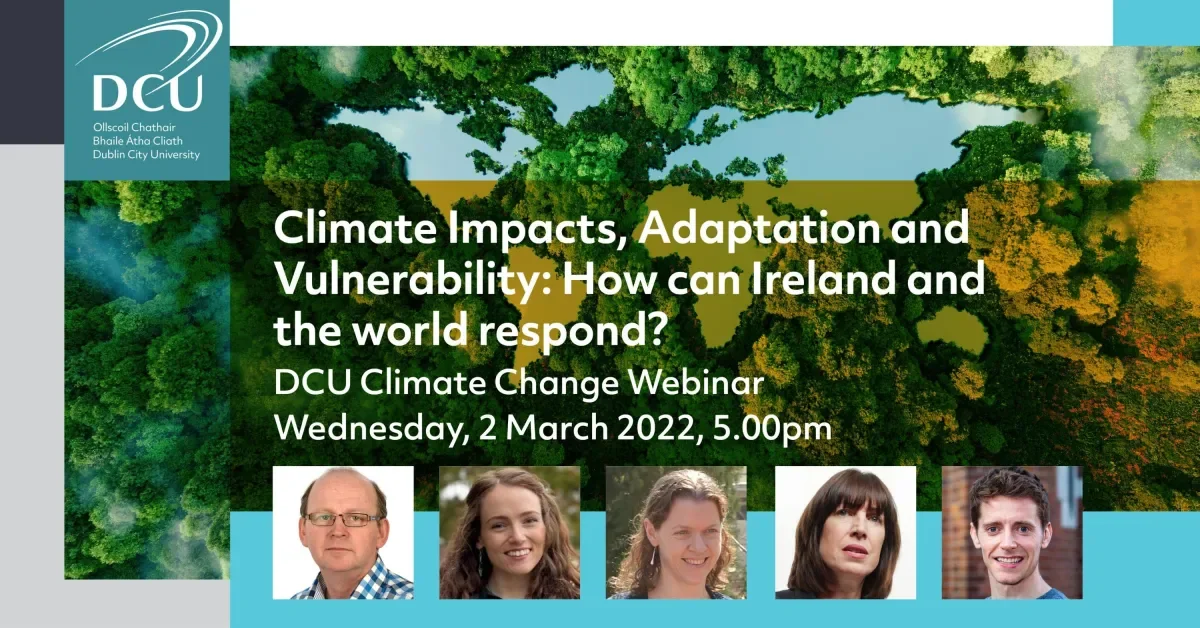
Climate Impacts, Adaptation and Vulnerability: How can Ireland and the world respond?
The Centre hosted a webinar on the UN Intergovernmental Panel on Climate Change (IPCC) report, which assesses the vulnerability of people and nature to climate change, and identifies options for adapting to it.
A panel of experts from academia, policy and civil society reflected on the landmark report and how Ireland and the world can respond.
2020
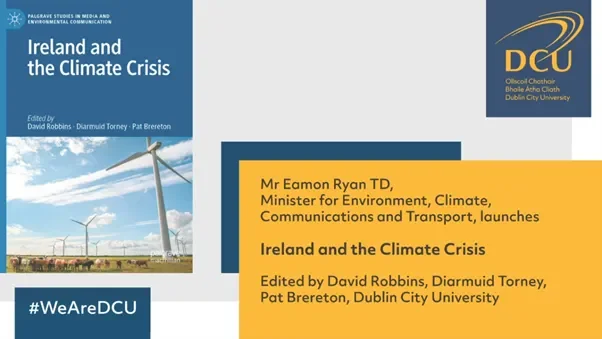
Eamon Ryan TD, Minister for the Environment, Climate and Communications, and Minister for Transport launched the book Ireland and the Climate Crisis, edited by the centre leadership team of Dr David Robbins, Dr Diarmuid Torney, and Prof Pat Brereton. The book examines Ireland’s response to climate change across a range of societal arenas, including politics, policy, media, education, civil society, and community activism. Other speakers at the launch included Prof Daire Keogh, President of DCU, Dr Tara Shine, a leading sustainability social entrepreneur with Change by Degrees, and Mary Foley, CEO of Eirgrid.
2019
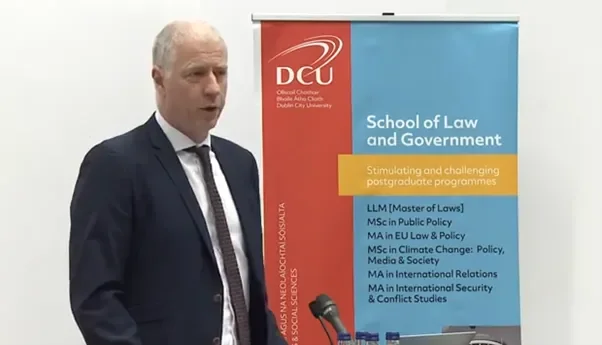
Centre members held a one-day conference on social science and humanities perspectives on Ireland’s response to the climate crisis. Hans Bruyninckx, Director of the European Environment Agency, spoke at the conference about the need for these perspectives in efforts to tackle climate change.
